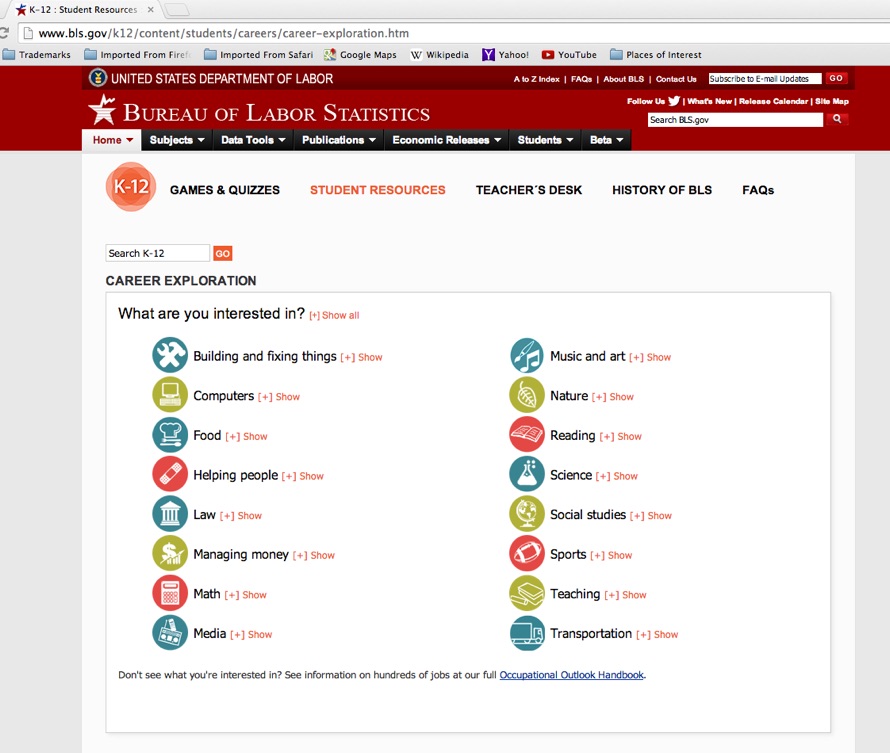Architecture and Engineering Occupations
Aerospace Engineering and Operations Technicians
Aerospace engineering and operations technicians operate and maintain equipment used in developing, testing, and producing new aircraft and spacecraft. Increasingly, these workers are using computer-based modeling and simulation tools and processes in their work.
Associate’s degree
$61,530
Aerospace engineers design aircraft, spacecraft, satellites, and missiles. In addition, they test prototypes to make sure that they function according to design.
Bachelor’s degree
$103,720
Agricultural engineers—also known as biological and agricultural engineers—work on a variety of activities. These activities range from aquaculture (raising food, such as fish, that thrive in water) to land farming to forestry; from developing biofuels to improving conservation; from planning animal environments to finding better ways to process food.
Bachelor’s degree
$74,000
Architects plan and design houses, office buildings, and other structures.
Bachelor’s degree
$73,090
Biomedical engineers analyze and design solutions to problems in biology and medicine, with the goal of improving the quality and effectiveness of patient care.
Bachelor’s degree
$86,960
Cartographers and Photogrammetrists
Cartographers and photogrammetrists collect, measure, and interpret geographic information to create maps and charts for political, educational, and other purposes.
Bachelor’s degree
$57,440
Chemical engineers apply the principles of chemistry, biology, physics, and math to solve problems that involve the production or use of chemicals, fuel, drugs, food, and many other products. They design processes and equipment for large-scale safe and sustainable manufacturing, plan and test methods of manufacturing products and treating byproducts, and supervise production.
Bachelor’s degree
$94,350
Civil engineering technicians help civil engineers plan and design the construction of highways, bridges, utilities, and other major infrastructure projects. They also help with commercial, residential, and land development. Civil engineering technicians work under the direction of licensed civil engineers.
Associate’s degree
$47,560
Civil engineers design, construct, supervise, operate, and maintain large construction projects and systems, including roads, buildings, airports, tunnels, dams, bridges, and systems for water supply and sewage treatment.
Bachelor’s degree
$79,340
Computer hardware engineers research, design, develop, and test computer systems and components such as processors, circuit boards, memory devices, networks, and routers. By creating new directions in computer hardware, these engineers create rapid advances in computer technology.
Bachelor’s degree
$100,920
Drafters use software to convert the designs of engineers and architects into technical drawings and plans. Workers specialize in architectural, civil, electrical, or mechanical drafting and use technical drawings to help design everything from microchips to skyscrapers.
Associate’s degree
$49,630
Electrical and Electronics Engineering Technicians
Electrical and electronics engineering technicians help engineers design and develop computers, communications equipment, medical monitoring devices, navigational equipment, and other electrical and electronic equipment. They often work in product evaluation and testing, using measuring and diagnostic devices to adjust, test, and repair equipment.
Associate’s degree
$57,850
Electrical and Electronics Engineers
Electrical engineers design, develop, test, and supervise the manufacturing of electrical equipment, such as electric motors, radar and navigation systems, communications systems, and power generation equipment. Electronics engineers design and develop electronic equipment, such as broadcast and communications systems—from portable music players to global positioning systems (GPS).
Bachelor’s degree
$89,630
Electro-mechanical Technicians
Electro-mechanical technicians combine knowledge of mechanical technology with knowledge of electrical and electronic circuits. They install, troubleshoot, repair, and upgrade electronic and computer-controlled mechanical systems, such as robotic assembly machines.
Associate’s degree
$51,820
Environmental Engineering Technicians
Environmental engineering technicians carry out the plans that environmental engineers develop. They test, operate, and, if necessary, modify equipment used to prevent or clean up environmental pollution. They may collect samples for testing, or they may work to mitigate sources of environmental pollution.
Associate’s degree
$45,350
Environmental engineers use the principles of engineering, soil science, biology, and chemistry to develop solutions to environmental problems. They are involved in efforts to improve recycling, waste disposal, public health, and water and air pollution control.
Bachelor’s degree
$80,890
Health and safety engineers develop procedures and design systems to prevent people from getting sick or injured and to keep property from being damaged. They combine knowledge of systems engineering and of health and safety to make sure that chemicals, machinery, software, furniture, and other consumer products will not cause harm to people or buildings.
Bachelor’s degree
$76,830
Industrial Engineering Technicians
Industrial engineering technicians help industrial engineers implement designs to effectively use personnel, materials, and machines in factories, stores, healthcare organizations, repair shops, and offices. They prepare machinery and equipment layouts, plan workflows, conduct statistical production studies, and analyze production costs.
Associate’s degree
$50,980
Industrial engineers find ways to eliminate wastefulness in production processes. They devise efficient ways to use workers, machines, materials, information, and energy to make a product or provide a service.
Bachelor’s degree
$78,860
Landscape architects plan and design land areas for parks, recreational facilities, private homes, campuses, and other open spaces.
Bachelor’s degree
$64,180
Marine Engineers and Naval Architects
Marine engineers and naval architects design, build, and maintain ships from aircraft carriers to submarines, from sailboats to tankers. Marine engineers work on the mechanical systems, such as propulsion and steering. Naval architects work on the basic design, including the form and stability of hulls.
Bachelor’s degree
$88,100
Materials engineers develop, process, and test materials used to create a range of products, from computer chips and aircraft wings to golf clubs and snow skis. They work with metals, ceramics, plastics, composites, and other substances to create new materials that meet certain mechanical, electrical, and chemical requirements.
Bachelor’s degree
$85,150
Mechanical Engineering Technicians
Mechanical engineering technicians help mechanical engineers design, develop, test, and manufacture mechanical devices, including tools, engines, and machines. They may make sketches and rough layouts, record and analyze data, make calculations and estimates, and report their findings.
Associate’s degree
$51,980
Mechanical engineering is one of the broadest engineering disciplines. Mechanical engineers design, develop, build, and test mechanical and thermal devices, including tools, engines, and machines.
Bachelor’s degree
$80,580
Mining and Geological Engineers
Mining and geological engineers design mines for the safe and efficient removal of minerals such as coal and metals for manufacturing and utilities.
Bachelor’s degree
$84,320
Nuclear engineers research and develop the processes, instruments, and systems used to derive benefits from nuclear energy and radiation. Many of these engineers find industrial and medical uses for radioactive materials—for example, in equipment used in medical diagnosis and treatment.
Bachelor’s degree
$104,270
Petroleum engineers design and develop methods for extracting oil and gas from deposits below the earth’s surface. Petroleum engineers also find new ways to extract oil and gas from older wells.
Bachelor’s degree
$130,280
Surveying and Mapping Technicians
Surveying and mapping technicians assist surveyors, cartographers, and photogrammetrists. Together, they collect data and make maps of the earth’s surface. Surveying technicians visit sites to take measurements of the land. Mapping technicians use geographic data to create maps.
High school diploma or equivalent
$39,670
Surveyors make precise measurements to determine property boundaries. They provide data relevant to the shape and contour of the Earth’s surface for engineering, mapmaking, and construction projects.
Bachelor’s degree
$56,230
Source: Bureau of Labor Statistics, U.S. Department of Labor, Occupational Outlook Handbook, 2014-15 Edition, on the Internet at http://www.bls.gov/ooh (visited May 21, 2015).
Here, you’ll find-out about the duties of the job, entry-level education, and pay. If you want more details, click on the bold titles. The Occupational Outlook Handbook (OOH) will open in another window and give you more detailed information such as how to become qualified for the work, projected number of new jobs, and similar occupations.
Step 2. Get the Details

Step 1. Identify Your Interests - based on your interests and abilities
Step 2. Get the Details - get detailed information on duties, requirements, income and more
Step 3. Listen to Interviews - get an insider’s perspective from someone who has done the work
MSW, MSG, LCSW
kathryn england

Choosing the Right Career

